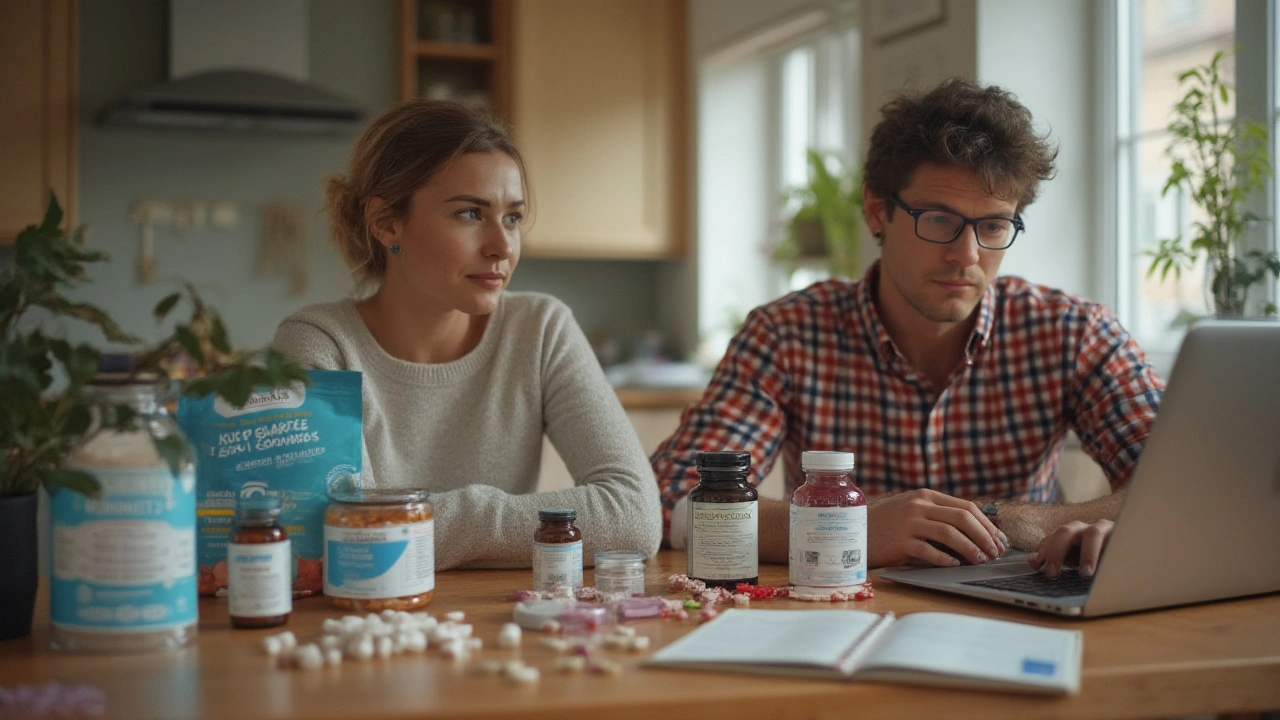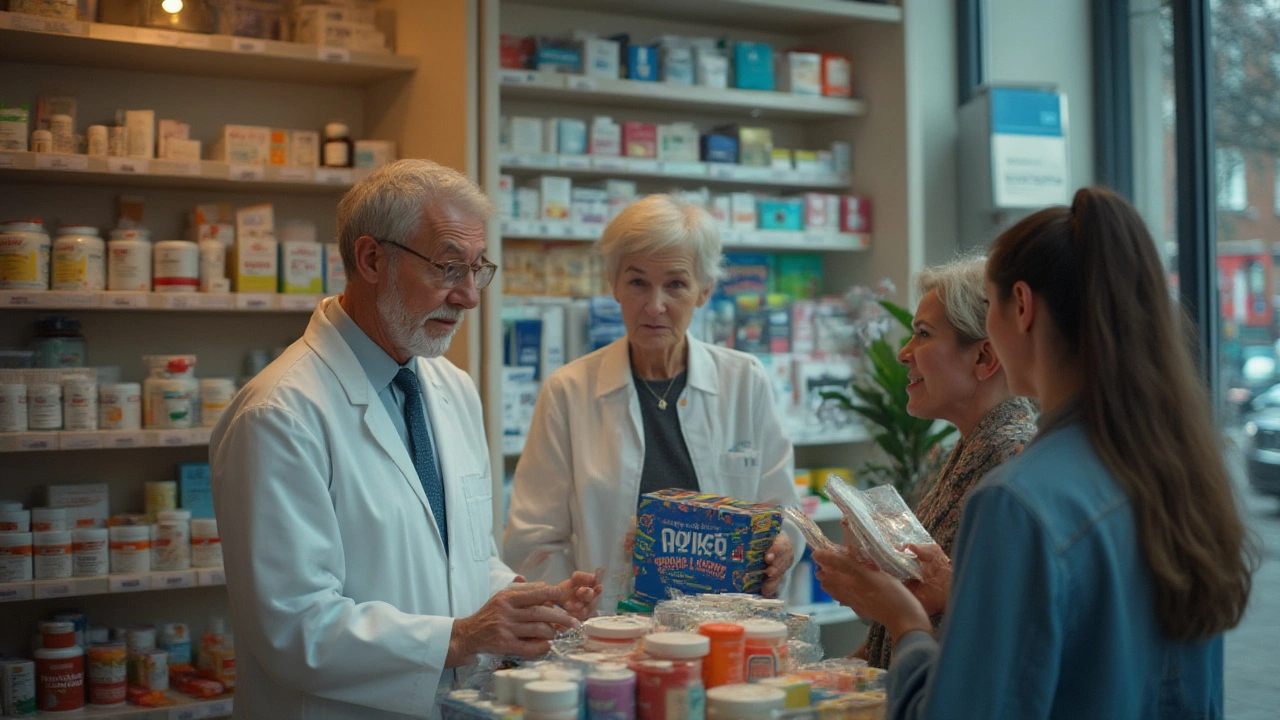Ever tried swallowing a spoonful of honey to beat your cough, or popped vitamin pills just because your mate swears he never gets sick? The struggle to choose between what drug ads, grandma’s kitchen folklore, and pop-up headlines say is real. Every day, you’ll find conflicting advice about health and medicine—your feeds are a battleground between modern science and old-school myths. Saving money, staying healthy, and avoiding risky habits all start with knowing what works versus wishful thinking. So, let’s slice through the noise and get down to what evidence shows us about real pharmaceuticals and those persistent (often expensive) health legends.
Where Myths Come From: Folklore, Fears, and False Promises
Take a look at any popular forum, and you’ll see wild claims about miracle cures. It’s not all your aunt’s fault, though. Most myths start as folk remedies passed down through generations. Others spill out from misunderstood medical facts, fear-driven headlines, or sneaky marketing by companies selling herbal teas and magic elixirs. A Harvard study found that nearly 50% of people in the UK have tried a home remedy in the last year. Sometimes people believe myths because the placebo effect is real—if you trust that ginger tea kills flu bugs, you might feel a little better, even if it’s all in your head.
The internet turbocharges these myths. Take detox teas, for example. Social media influencers push them by showing off toned abs and bright smiles, but there’s zero evidence that the liver needs any help from herbal blends. Scientific research repeatedly proves our organs detox perfectly well if we give them water, rest, and nutrition, not overpriced powder. Then there’s the persistent fear about “chemicals” in medicine—a word that sounds scary if you forget water is a chemical too.
Sometimes myths stick around because real medical treatments don’t always deliver instant, magical results. Compare the subtle progress of a cholesterol drug to the instant wow of spicy soup when you have a head cold—no contest in the entertainment department. But only one is proven in randomized controlled trials, and it’s not grandma’s soup.
Commercial interests don’t stop at herbal teas. Unregulated supplement markets pump out products that promise more energy, better memory, or super-powered immune systems. The real shock? The 2022 British Medical Journal review found that less than 15% of supplements sold online contained what their labels claimed. The bottom line: just because everyone’s talking about it doesn’t make it true. Science demands proof before it accepts anything as fact.
How Pharmaceuticals Are Proven: Trials, Stats, and Real-World Use
You pop a painkiller for a headache, and you want to know it’s doing more than giving your wallet a workout. The journey from lab to pharmacy isn’t short. First, there’s the petri dish, then animal studies, and then human trials. For a drug to reach the shelf in the UK, it has to pass three phases of rigorous testing. What’s wild is how many drugs fail. Only about 12% of medicines that start in the lab make it to the prescription pad.
So, what exactly is a clinical trial? Picture this: thousands of volunteers (often across several continents) get the drug, and just as many get a placebo or an already-known medicine. Scientists don’t know who gets what until the end—a process called double-blinding—to kill any bias. That’s a lot more reliable than a YouTube influencer drinking celery juice and sharing results with their followers.
Numbers matter. Before approval, drugs must show “statistically significant” results. This means, for example, if a new cholesterol medication lowers numbers better than a sugar pill in enough people, it wins. Not only that, it needs to prove safety. Regulators like the UK’s Medicines and Healthcare products Regulatory Agency (MHRA) demand transparent data—side effects, risks, and long-term follow-up—before giving the green light.
| Stage | Purpose | Success Rate |
|---|---|---|
| Preclinical | Lab & animal research | ~30% |
| Phase 1 | Safety, dose in healthy volunteers | 63% |
| Phase 2 | Effectiveness, side effects | 31% |
| Phase 3 | Large-scale testing | 58% |
Drugs that cross all these hurdles are tracked long after they’re approved. Hospitals, doctors, and patients keep reporting any odd symptoms or unlisted side effects. This is called pharmacovigilance. If new problems crop up, drugs can be pulled fast. Remember Vioxx? Approved in 1999, withdrawn in 2004 once higher heart attack rates poured in. The safety net never sleeps.
Strong proof, repeatable results, and tough regulation make pharmaceuticals reliable. If a company fudges the numbers, big fines (and scandal) follow. No detox smoothie has to jump through these hoops.

Famous Myths Busted: From Antibiotics for Colds to Superfood Cures
The legend that antibiotics help with colds just won’t die. Every winter, GPs across the UK field calls for a quick prescription. The reality? Colds and most flus are caused by viruses, and antibiotics don’t touch viruses—they nuke bacteria. The result? Not only do you waste money and time, but the UK now faces a real crisis with antibiotic-resistant “superbugs.” A 2023 NHS report estimated that over 7,000 deaths last year were down to bugs resistant to standard drugs. So next time you grab antibiotics for a sniffle, you’re not helping yourself—or anyone else.
Got a bottle of echinacea tablets for “immunity”? Every few years, someone in the family discovers this herb and claims it’s a miracle. Double-blind trials, including a big one out of Cardiff University, showed no difference between echinacea and placebo for preventing colds. The story is the same for “superfoods” like acai berries or goji berries. Sure, they’re packed with vitamins, but a regular apple gives you the same punch at a fraction of the price.
Let’s talk pain. Many folks swear by topical creams containing menthol or camphor for arthritis. These make your skin feel cool or warm, tricking your brain into thinking pain has faded. But research shows prescription anti-inflammatory gels, like diclofenac, deliver lasting pain relief because they block the enzymes causing inflammation, not just mask it for an hour.
One of the hardest myths to shake is “natural equals safe.” Hemlock is natural—deadly too. The real cause for alarm isn’t just wasted money, it’s potential harm. In 2019, a British Medical Journal review reported over 400 cases where herbal supplements caused liver damage in the UK. “Natural” isn’t a magic shield.
Finally, skeptics love to warn against vaccines—especially flu shots—claiming they “make you sick.” In reality, flu vaccines train your immune system with inactivated or weakened virus particles. Several studies, including a decade-long Public Health England review, show the shot reduces risk of severe illness and hospitalisation by 40-60%, especially in older adults. No home-brewed syrup can pull that off.
When Myths Turn Dangerous: Risky Remedies and Fake Hope
The real threat with health myths isn’t mild embarrassment—it’s danger. The UK’s National Poison Information Service logged a rise in herbal supplement overdoses since 2021, mainly because people mix ingredients found online or double-dose thinking “it’s just vitamins.” Most folk don’t know that vitamin A overdoses can cause liver problems, or that large doses of certain supplements can make medications less effective.
The story gets scarier with chronic diseases. Cancer patients sometimes skip chemo or delay therapy for “miracle” diets and herbal cocktails. A sobering American Cancer Society study reported a 50% drop in survival rates among patients who ditched proven treatment for alternative medicine alone. People spend fortunes on “alkaline water” machines or sugar-free gum promoted as cancer cures—with no scientific backing.
Another real risk is interactions: herbal teas and supplements can trip up prescription meds, sometimes with disastrous results. St. John’s wort, popular for “natural” depression treatment, can weaken the effect of crucial meds like anti-HIV drugs or birth control pills. The problem? Supplements aren’t tested for interactions in the way pharmaceuticals are. You often only find out when someone lands in hospital.
Social media pressure is ruthless. “Wellness” culture tells folks they’re failing if they don’t buy every new oil, patch, or powder. But being both healthy and broke isn’t a win. Pharmaceutical drugs, on the other hand, are covered by the NHS under strict guidelines, making them safer and more affordable than hopping from one flashy herb to the next. Fake hope sucks up cash and time you could spend actually getting better.
If you’re ever unsure whether something is safe or effective, talk to your GP or pharmacist. They’ve seen every myth under the sun and will tell you straight—often with better stories than the internet could invent.

Your Toolbox: Sorting Facts, Smarts, and Real Results
So what can you actually trust? Start by checking NHS or MHRA resources whenever you hear a new claim. Reliable meds always have long ingredient lists, real data, and side effects listed. Bold, simple “miracle cure” promises are a red flag. Think about it: if hot lemon water truly ended colds overnight, doctors would recommend it—and drug companies would bottle it.
Read beyond the headlines. Next time you see a “study” cited, look it up. Real studies are published in peer-reviewed medical journals, not hidden behind flashy ads. If you fancy a home remedy for mild symptoms, no harm—just tell your doctor what you’re taking so you don’t risk a dangerous mix-up. Save your wallet from empty promises by asking: does this have scientific backing, or does it sound too good to be true?
Finally, listen to your body and your GP—not a stranger on TikTok with a discount code for new capsules. Science may not offer instant miracles, but it delivers steady, proven results. Medications today are safer and more effective than ever, thanks to decades of testing, regulation, and brave volunteers in clinical trials. Don’t ditch common sense for a legend. Your health's future deserves better than yesterday’s stories. When in doubt, always bank on what’s proven to work.


